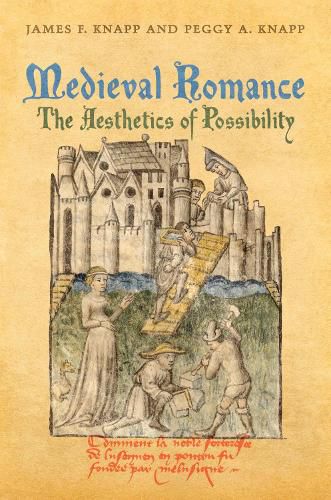Readings Newsletter
Become a Readings Member to make your shopping experience even easier.
Sign in or sign up for free!
You’re not far away from qualifying for FREE standard shipping within Australia
You’ve qualified for FREE standard shipping within Australia
The cart is loading…






Widely heard and read throughout the middle ages, romance literature has persisted for centuries and has lately re-emerged in the form of speculative fiction, inviting readers to step out of the actual world and experience the intriguing pleasure of possibility.
Medieval Romance is the first study to focus on the deep philosophical underpinnings of the genre’s fictional worlds. James F. Knapp and Peggy A. Knapp uniquely utilize Leibniz’s possible worlds theory, Kant’s aesthetic reflections, and Gadamer’s writings on the apprehension of language over time, to bring the romance genre into critical dialogue with fundamental questions of philosophical aesthetics, modal logic, and the hermeneutics of literary transmission. The authors’ compelling and illuminating analysis of six instances of medieval secular writing, including that of Marie de France, the Gawain-poet, and Chaucer demonstrates how the extravagantly imagined worlds of romance invite reflection about the nature of the real. These stories, which have delighted readers for hundreds of years, do so because the impossible fictions of one era prefigure desired realities for later generations.
$9.00 standard shipping within Australia
FREE standard shipping within Australia for orders over $100.00
Express & International shipping calculated at checkout
Widely heard and read throughout the middle ages, romance literature has persisted for centuries and has lately re-emerged in the form of speculative fiction, inviting readers to step out of the actual world and experience the intriguing pleasure of possibility.
Medieval Romance is the first study to focus on the deep philosophical underpinnings of the genre’s fictional worlds. James F. Knapp and Peggy A. Knapp uniquely utilize Leibniz’s possible worlds theory, Kant’s aesthetic reflections, and Gadamer’s writings on the apprehension of language over time, to bring the romance genre into critical dialogue with fundamental questions of philosophical aesthetics, modal logic, and the hermeneutics of literary transmission. The authors’ compelling and illuminating analysis of six instances of medieval secular writing, including that of Marie de France, the Gawain-poet, and Chaucer demonstrates how the extravagantly imagined worlds of romance invite reflection about the nature of the real. These stories, which have delighted readers for hundreds of years, do so because the impossible fictions of one era prefigure desired realities for later generations.